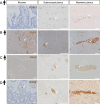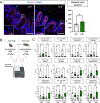Enteric glia regulate Paneth cell secretion and intestinal microbial ecology
- PMID: 40227232
- PMCID: PMC11996175
- DOI: 10.7554/eLife.97144
Enteric glia regulate Paneth cell secretion and intestinal microbial ecology
Abstract
Glial cells of the enteric nervous system (ENS) interact closely with the intestinal epithelium and secrete signals that influence epithelial cell proliferation and barrier formation in vitro. Whether these interactions are important in vivo, however, is unclear because previous studies reached conflicting conclusions (Prochera and Rao, 2023). To better define the roles of enteric glia in steady state regulation of the intestinal epithelium, we characterized the glia in closest proximity to epithelial cells and found that the majority express the gene Proteolipid protein 1 (PLP1) in both mice and humans. To test their functions using an unbiased approach, we genetically depleted PLP1+ cells in mice and transcriptionally profiled the small and large intestines. Surprisingly, glial loss had minimal effects on transcriptional programs and the few identified changes varied along the gastrointestinal tract. In the ileum, where enteric glia had been considered most essential for epithelial integrity, glial depletion did not drastically alter epithelial gene expression but caused a modest enrichment in signatures of Paneth cells, a secretory cell type important for innate immunity. In the absence of PLP1+ glia, Paneth cell number was intact, but a subset appeared abnormal with irregular and heterogenous cytoplasmic granules, suggesting a secretory deficit. Consistent with this possibility, ileal explants from glial-depleted mice secreted less functional lysozyme than controls with corresponding effects on fecal microbial composition. Collectively, these data suggest that enteric glia do not exert broad effects on the intestinal epithelium but have an essential role in regulating Paneth cell function and gut microbial ecology.
Keywords: Paneth cells; antimicrobial peptides; enteric nervous system; glial cell; infectious disease; microbiology; mouse; neuroscience.
© 2024, Prochera, Muppirala et al.
Conflict of interest statement
AP, AM, GK, SS, AS, LS, BI, HR, FK, KP, KS, TA, SR, SH, MR No competing interests declared
Figures















Update of
-
Enteric glia regulate Paneth cell secretion and intestinal microbial ecology.bioRxiv [Preprint]. 2024 Dec 23:2024.04.15.589545. doi: 10.1101/2024.04.15.589545. bioRxiv. 2024. Update in: Elife. 2025 Apr 14;13:RP97144. doi: 10.7554/eLife.97144. PMID: 38659931 Free PMC article. Updated. Preprint.
References
-
- Adolph TE, Tomczak MF, Niederreiter L, Ko H-J, Böck J, Martinez-Naves E, Glickman JN, Tschurtschenthaler M, Hartwig J, Hosomi S, Flak MB, Cusick JL, Kohno K, Iwawaki T, Billmann-Born S, Raine T, Bharti R, Lucius R, Kweon M-N, Marciniak SJ, Choi A, Hagen SJ, Schreiber S, Rosenstiel P, Kaser A, Blumberg RS. Paneth cells as a site of origin for intestinal inflammation. Nature. 2013;503:272–276. doi: 10.1038/nature12599. - DOI - PMC - PubMed
-
- Ahonen A. Histochemical and electron microscopic observations on the development, neural control and function of the Paneth cells of the mouse. Acta Physiologica Scandinavica. 1973;398:1–71. - PubMed
MeSH terms
Substances
Associated data
- Actions
- Actions
- Actions
- Actions
- Actions
- Actions
- Actions
- Actions
- Actions
Grants and funding
LinkOut - more resources
Full Text Sources
Research Materials

